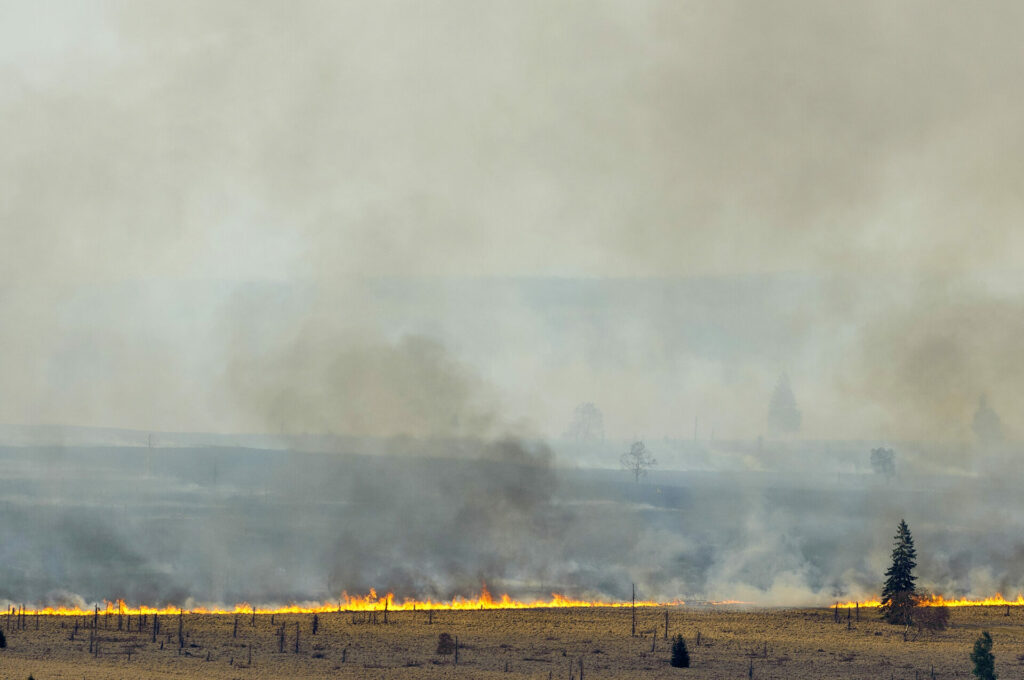From tomorrow (Thursday 11 August), the risk code for wildfires will go from orange to red – the highest possible risk code – for all of Flanders due to the ongoing drought and heatwave, announced the Agency for Nature and Forest.
Following a call by the Antwerp fire brigade for people to postpone barbecues and campfires to prevent fires, Flanders has upped its risk code to the highest level – meaning there currently is an "acute high danger" of fire.
"The past summers are undoubtedly in everyone's memory: the drought prevailed at times. Today, too, we are in the middle of a very dry period," said Flemish Nature Minister Zuhal Demir.
"With the heavy and smaller fires in our nature reserves in recent years, this means that we have to be very careful in our nature and moorland areas. Together with all our foresters and supervisors, we therefore ask everyone to be very vigilant," she added. "Anyone who notices a suspicious plume of smoke should report it immediately by calling 112."
🔴 Morgen, 11 aug, gaat de risicocode voor #natuurbranden in Vlaanderen van oranje naar rood, de hoogst mogelijke risicocode, vanwege de aanhoudende #droogte en voorspelde #hittegolf. Roken en/of vuur maken is sinds deze week permanent verboden in bossen en natuurgebieden. pic.twitter.com/dWEghbjhJw
— Natuur en Bos (@natuurenbos) August 10, 2022
Some small-scale fires were also regularly reported in recent weeks, and while the Agency for Nature and Forests stressed that it understands that the shade in forests can offer the necessary coolness, it asked everyone to use their common sense.
It is currently "extremely dry" in Flanders, according to the Royal Meteorological Institute (RMI), which is predicting persistently hot temperatures around 35°C in the coming days, and therefore decided to raise the risk code to red from Thursday morning.
'Bone-dry' grass
"For safety reasons, access to natural and forest areas is not recommended, and making a fire is forbidden. Nature managers and the fire brigade are extra vigilant," the Agency said on its website. "If a fire breaks out, the fire brigade always turns out with large equipment, and extra equipment and manpower are also deployed. The fire towers will also be manned."
People are also urged not to smoke or light fires in forests and nature areas and, as always, not to leave litter lying around: a piece of glass can easily have a lens effect that concentrates the sun's rays onto a small area and starts a fire, even a small spark can form the basis for a larger fire.
In the meantime, the technical experts of the VAB's car breakdown assistance also warned of fires on grass and verges, as they are currently "bone-dry," which automatically means a fire hazard. The VAB alarm centre noted that in July, the number of breakdowns involving smoke or fire was almost twice as high as in 2019. "The warm temperatures, both at home and abroad, are certainly responsible for this."
Related News
- Heavy fire in the dunes on Belgian coast under control
- Fire brigade pleads people to postpone barbecues and campfires
- Belgium starts hottest week of 2022, first real heatwave expected
While it seems trivial, the most important thing to prevent a fire is looking carefully at where you park your car. "In case of a grass or verge fire – such as the recent one in De Haan – people often first think of a carelessly left cigarette butt, overheating or a short circuit in the car, but such a 'spontaneous' fire can also have a completely different cause."
In a diesel vehicle, for example, the particulate filter can reach a temperature of over 500 degrees at any given time – a temperature at which dry wood can spontaneously combust. Therefore, it is not a good idea to park a vehicle on or against an uncut grass verge during prolonged drought and extreme heat, "just think of a festival parking lot, for example."
They even recommend not to drive with the rear wheels up against the curb in parking lots. The engine and exhaust would then hang over the grass edge, with potentially disastrous consequences. The heat from the exhaust can also be intense enough to ignite dry grass.

